 loading
loading
featuresFirst-person stories: gratitude"With opportunity came responsibility—the responsibility to excel, lest other women not be allowed to follow in my footsteps." 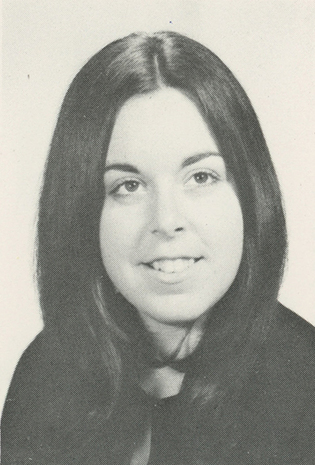 View full imageThese stories were written by women responding to our request for memories of their experiences as the first female undergrads at Yale. See other stories on these topics: In the Colleges, Yale Administration, In the Classroom, May Day, and Yale Men. You’ll see that some writers’ names are asterisked. These women submitted their stories also to the Written History Project, founded by the 50th Anniversary Committee so that all alumnae of the time can contribute to the history of coeducation at Yale College. (There’s also an Oral History Project and an Archives Project.) And finally: we invite all readers to send their letters and reactions—including stories of their own experiences of breaking boundaries at Yale—to editor@yalealumnimagazine.com. _____________________________ Abby L. Bloom ’72, ’75MPH When I reflect back on my Yale experience, a single word sums it up: “opportunity.” The opportunities Yale offered opened so many new worlds for me. The cumulative effect was to change the course of my life. And hopefully I have also changed for the better the lives of many during my lifelong career in health and social services globally, and especially in Australia, where I have lived for 35 years. In accepting and educating women like me in 1969 Yale created a new cadre of women, many of whom would change the world for individuals and nations. For me, opportunities unattainable but through Yale included a summer internship with David Rockefeller when he led Chase Manhattan bank; a tip from my anthro professor that led me to document the Rastafari (and their addictive music!) long before anyone in the US had ever even heard of them; and full immersion in the study of French with Yale’s world-leading French department. Yale enriched my life then and forever. It helped me become the global citizen that I had always aspired to be. And it did so simply by opening the door to a restless and inquiring mind and guiding me to a whole new level of potential. For that I am eternally grateful.
Kathleen Virginia “Kit” McClure ’73 (graduated ’75) Freshman year I lived in the Vanderbilt dormitory with friendly and sensible roommates. I felt that they were much more mature than myself, and they did their best to encourage me to calm down and focus on being a college student. I moved off campus by sophomore year. I had joined a feminist rock-jazz band with friends I made in the New Haven women’s liberation movement, and I lived in various women’s collectives with them. My new roommates and bandmates were mostly older and more experienced than myself. I benefited greatly from the day-to-day contact with them, from their personal/political/humanist ideas and actions. Some were deeply involved with the abortion rights struggle, the New Haven Black Panther Party, the Gay Liberation Movement, the study of Marxism-Leninism. I learned so much.
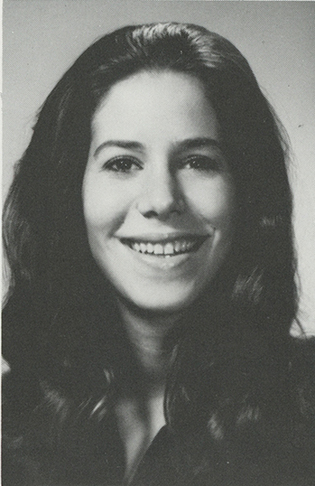 View full imageJulie Copeland ’71 Best academic experience ever: senior seminar with Professor Cleanth Brooks on the novels and short stories of William Faulkner. The seminar consisted of my reading one of Faulkner’s works each week and then attending a two-hour meeting with Professor Brooks to discuss what I had read. We met in his office, the late afternoon sun pouring in, and I had the privilege of sitting with the foremost scholar on Faulkner to discuss my readings. An academic experience does not get much better than that. Professors at Yale were always welcoming and wanted to have female students in their classes. My best friendships came from meeting people from all over America, not just from New York, where I had grown up. In meetings with alums, some were at first very skeptical and standoffish—but in my experience eventually embraced the opening of Yale to women.
Linda Rae Benjamin ’72, formerly Linda Marvin Pease I transferred in from Smith in 1970 and graduated in 1972. I was a married student with one child at that point and had a second by the time I graduated. I lived off campus but was affiliated with Berkeley College. Life was frantic, fun, and challenging. I never got very involved in college activities but am proud to have been there in those exciting times.
Vicki Hammond ’72 All my professors treated me with respect, and I was given remarkable support and encouragement in my painting and drawing classes. Drawing and painting classes with Bernard Chaet were what I loved most at Yale. He was a terrific teacher for anyone who wanted to fully engage in a creative process, because he could look at work intellectually, yet also communicate the sensory and emotional qualities needed to make it great. Topping it off, I could easily view outstanding work by people who’d devoted their lives to art—both in the Yale University Art Gallery and the vast art library across the street. It was all very, very compelling.
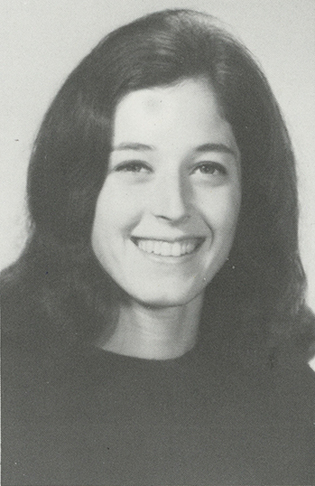 View full imageLinda Corwin ’71 A smile still comes to my face every time I think about Yale. What a unique and historic experience it was to enter Yale College as one of the first women ever to do so. At the time, I really wasn't focused on how historic it was. I was just focused on what a marvelous thing it was to be, every day, among such bright, funny, and engaged people. I had long felt that being in a class learning about anything was just such a luxury. Being a student in the classes of the outstanding professors at Yale, as well as my outstanding fellow students—well, it was just fabulous. I felt that women were welcomed in the classroom, in the dining halls, at sporting events, wherever. I think we all felt part of a very special place, and that created a bond among us. To be sure, there were trying times on campus while I was there. World and national affairs were so turbulent. The way that turbulence was navigated by the Yale campus, especially our leader, President Kingman Brewster, was remarkable. There were many discussions, with people taking one side or another of all of the issues we were trying to tackle, but I felt it was all handled, both by students and by the administration, with great aplomb.
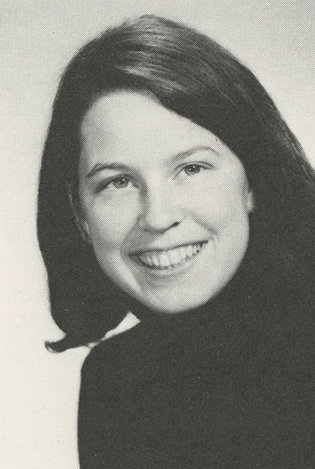 View full imagePatricia Myerson Huntington '72 Music floated in the air at Yale. Since there was no air conditioning or ear buds, walking around Yale exposed one continuously to music. One day, I saw a “Help Wanted” sign for ushers for Woolsey Hall. My interview consisted of one question: “Do you have a black dress?” “No problem,” I responded, and was hired on the spot. I ran back to my dorm to call my mother, who went to a thrift shop and found me three black dresses. She boxed them up and brought the box to the Greyhound Bus station, and a few hours later, I picked up my parcel at the New Haven bus terminal. I got paid $3 a concert to distribute programs and to pick programs up and flip back the seats afterward. At the time, Russia was sending its top performers throughout the US to raise hard cash, so I got paid to hear David Oistrakh and Sviatoslav Richter perform. I presented the bouquets of flowers to David Oistrakh, and when I thanked him in Russian, he pinched my cheek. (Not a sexist move.) No one was allowed to approach Richter; I believe the Russians were afraid he’d defect. The Ukrainian community of New Haven showed up to see him and brought horseshoe wreaths of flowers which they waved to show their love for him. I learned to request ushering in the left balcony, because in the front row there were always two empty seats. I think they were reserved for the Brewsters, but as soon as the lights dimmed, I would slip into one and feel so lucky to be paid to hear gorgeous music. We were also spoiled by our generation’s songwriters: the Beatles, the Rolling Stones, Hendrix, and so many others. A friend got a copy of Abbey Road and organized a listening gathering. There were perhaps six of us, and we turned off the lights, lay on the floor, and listened as the tunes slid seamlessly into each other. It was like no prior album. We had no drugs, no sex—just rock and roll enchanting us and carrying us off. On March 7, 1970, there was a total solar eclipse. I watched it from Wrexham Tower. When the sun began emerging, it seemed like everyone who owned Abbey Road put the needle arm down on “Here Comes the Sun.” Sunlight returned to the stereophonic sound of hundreds of stereos.
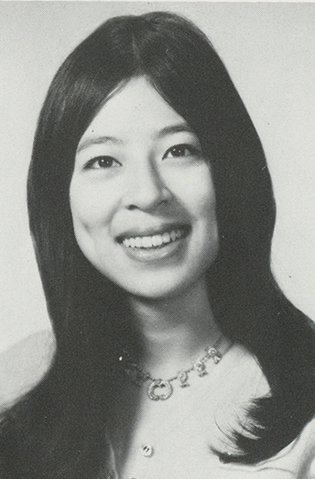 View full imageAlice Young ’71 Yale was my third college matriculation in three years, so adapting to changing environments was not new to me. I had spent my freshman year at the University of Hawaii, an Asian American on a mostly Asian campus, and my sophomore year at Georgetown University—predominantly white, male, and Catholic. So Yale could easily have been strike three in my quest for a great educational experience. In truth, coming from Georgetown, all-male Yale was not such a shocking change for me. On the other hand, as a woman and as one of only nine Asian Americans in my class at the height of the Vietnam War, I think I was much more disconcerting to my fellow Yale men and alumni than they were to me! As Master’s Aide in Davenport College, one of my jobs was to attend alumni reunion cocktail parties to try to reassure them that women and minorities were not going to ruin their alma mater, and in fact could well become worthy future leaders. In many ways, my successful career trajectory as a law firm partner and community leader was fueled by my desire to prove that we deserved our Yale diplomas, and that we could also be successful in our personal lives. Not only did I not strike out—I think we Yale women hit a home run.
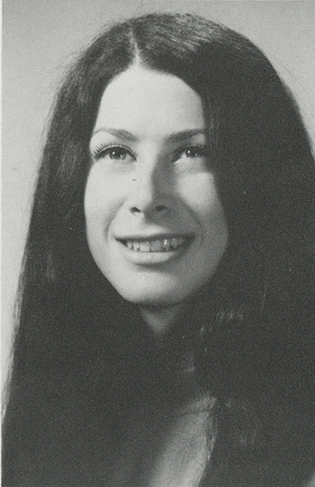 View full imageDoreen Gluckin ’71 “I’m going to be a Yale man!” I thought to myself as I moved into room 1488 of Pierson College in the fall of 1969. With a little luck, and a lot of studying, I too—wearing blue eye shadow and silver nail polish—would graduate from Yale.The environment at Yale in 1969 was crackling with change. It was liberating. I had transferred from the all-female environment of Smith College. In contrast, at Yale there were men everywhere—brilliant, interesting men. There was no dress code. No curfew. I felt free. Free to take amazing classes, free to sit at meals for hours, engaged in passionate debate or quiet conversation, free to don a purple leotard and take a modern dance class at Payne Whitney Gymnasium. Please don’t get me wrong. I liked Smith. But I loved Yale, in a deep visceral way. However, Yale wasn’t all purple leotards and dance classes. There was the professor who indirectly questioned my intelligence on the first day of a seminar in molecular biophysics and biochemistry; I set him straight with my score on the first quiz. And there was the professor who shocked me by suggesting that we go away together for a weekend. Yes, I was an aspiring “Yale man,” who, along with 17 other Yale men, majored in MB&B. It was an exciting, challenging major. The men were like the brothers I never had, except for the one who became my boyfriend and later, at Stanford Medical School, my husband—for a few years. To this day I am grateful that Yale accepted me. Not only did I receive a superior education in and out of the classrooms, but I also made lifelong friends. With opportunity came responsibility—the responsibility to excel, lest other women not be allowed to follow in my footsteps. Casual conversation at tenth reunion stimulated me to write a women’s health book, The Body at 30: A Woman Doctor Talks to Women. Yes, I am grateful and glad to be a Yale woman.
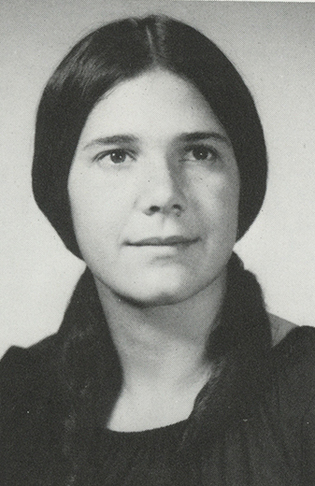 View full imageSusan Ellen Waisbren ’71* Herb Cahoon, director of Dwight Hall, suggested I become a “big sister” to a young woman with “mental retardation” at New Haven Regional Center, an innovative community program for adults with disabilities. After a month taking Valerie out for lunch or to the movies, I met with my supervisor there who suggested I speak with a psychology professor from Yale who consulted to the program. Seymour Sarason responded to my queries about pursuing a career in the field of intellectual disabilities with “Come with me to Syracuse tomorrow.” I believe he even paid for my plane ticket to meet with Burt Blatt, author of Christmas in Purgatory (1966), an exposé of institutions at that time, with photographs drawing national attention to the abuse and neglect of people with intellectual disabilities. Burt had introduced the concept of “normalization,” to ensure that all people could live in a more normal environment. On the plane ride home, I mentioned that what Valerie needed wasn’t another educational program, but a halfway house. Seymour replied, “Start one! I’ll help you.” I came home to tell my good friend, Francie Brody, that we were going to start a halfway house. Herb Cahoon taught us how to write a grant proposal. Seymour helped us recruit inmates from Southbury Training School (one of the big institutions outside of New Haven), and the New Haven Regional Center staff provided supervision and furniture. With a $1,000 grant from Dwight Hall, Marrakech House came into existence. With seven women from Southbury and two from the community, Francie and I moved into a rented house on Crown Street. I’ll never forget our pride in the first meal the women cooked independently, macaroni and cheese with cut-up hotdogs! I’ll never forget their bewilderment when we introduced sex education, or their enthusiasm for the Friday Night Coffee House we opened to men as well as women with intellectual disabilities. In our reports about the program we wrote, “Normalization does not mean merely adjusting to society’s norms. It means educating the community to expand its definition of ‘normal.'” After the first summer of Marrakech, we added, “We never really wanted normalization. We wanted something better. Too often, normalcy in our society means conformity and compromise. We strove for consciousness, tolerance, and imagination.” After graduating in 1971, I worked at Southbury Training School for a year as well as with Marrakech. Then I pursued a PhD in clinical psychology at the University of California–Berkeley. Frank McCarthy became the Director of Marrakech for 45 years and built it into the thriving organization it is today, serving over 1,300 children and adults annually. Although facing challenges adjusting to Yale, I discovered what I wanted to do with my life and the confidence to pursue it.
Mary Corliss Pearl '72 I learned to play squash at Yale, and quickly came to love the sport. The men’s coach was very encouraging to female players, gave me my first (used) racquet, and created a women’s team in 1971. I was very proud to have been invited onto the team. Overall I loved my Yale experience, and what I appreciated most was meeting and conversing with incredibly diverse movers and shakers of the world, including Carmen de Lavallade, Anna Freud, Ted Kennedy, Robert Motherwell, and Jerzy Kosinski; learning from accomplished and passionate scholars, including David Pilbeam, Vincent Scully, and Edmund Morgan; and drinking cup after cup of coffee in the Davenport dining hall with fellow students—some of the funniest and most agile minds I’ve ever encountered.
The comment period has expired.
|
|